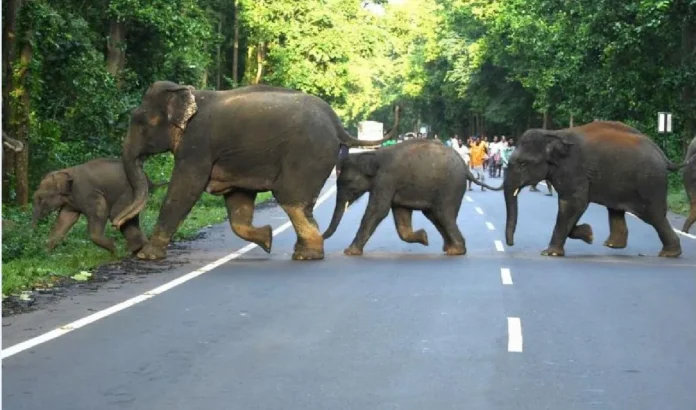By Sujit Bhar
If the gullible Indian has been made to believe that India is generally kind to wild and/or domesticated animals—specific to this are the many governmental actions, legal and otherwise, taken for the protection of cows—the citizens have actually been forced to swallow the bitter pill of untruth. India, for all practical purposes, has only shown extreme cruelty to such animals and several cases of elephants in the wild and in captivity suffering and even dying have been recorded, with no action being taken to prevent such instances.
Such a case was brought before the Supreme Court recently. The top court of the country was forced to issue notice to West Bengal when a contempt petition pointed out that the state, committed “wilful disobedience” of an undertaking that it had given to the Court of not using inhumane methods to ward off elephants from areas populated by humans. The contempt petition also pointed out that the state continued to use spikes for the purpose when it had promised to use only fire-torches, that too only if an emergency arose. This was in direct contravention of the Court’s order and a total disregard of the undertaking that the state itself had given to the Court.
The petition was detailed, with photographs that showed how the state kept on using such methods and such documentation reached the top court enough for a two-judge bench to reiterate its 2018 order wherein it had said: “Wherever the spikes or fireballs are used for driving elephants, remedial steps should be taken by the concerned states for removing the spikes and desisting from using the fireballs.”
In December 2018, in its submission before the Court, the state had said that mashaals or fire-torches were the only method available at that point of time, since the annual migration of elephants was about to begin. The state had also said that time was too short to try and implement any other tried and tested humane method.
Even with the use of mashaals, the state had promised the Court that they “may be used” only as an emergency measure and would be done by the forest department only. The state had also said that this would be done only “for the time being, to avoid any deaths and crop damage that may take place and ensure the proper movement of elephants in the corridors”.
While that was the stand of the state on torches in 2018, it had “categorically stated” that spikes were not being used and would not be used. The state had gone so far as to say that it would consult the Wildlife Institute of India for advice on the humane methods available to deter elephants from coming into areas with human population and that methods used would be as per those mentioned in the guidelines issued by the environment ministry “for the purpose of reducing, if not, eliminating human-elephant conflicts”.
The top court bench of Justices BR Gavai and KV Viswanathan issued notice to the state, returnable in four weeks. The bench, though, dispensed with the personal appearance clause for now.
Advocate Rashmi Nandakumar appeared for the petitioner Prerna Singh Bindra and Advocate Suhasini Sen appeared for the Union government. The original writ petition was filed in 2018 to highlight the “cruel and torturous” methods used in four states—Karnataka, West Bengal, Jharkhand, and Odisha—to manage human-wildlife conflict, and in particular human-elephant conflict in the affected areas. The Court had heard the matter on several occasions after that during the course of which West Bengal made the undertaking.
The contempt petition, filed by advocate Shibani Ghosh, says: “The use of mashaals, sharp metal rods, fireballs, inflammable objects, etc., as a method to scare away elephants is extremely cruel and barbaric and causes immense mental trauma and physical distress to the elephants on a regular basis.”
Accompanying the petition were photographs taken on August 15 this year in the Jhargram district of West Bengal. One of the photographs shows a hula party—a group of local people deployed by forest officials in jungle areas to avoid human-elephant conflict—with burning mashaals while another shows an injured pregnant elephant mother with a rod near her spine. That elephant later succumbed to injuries.
According to the petition, hula parties primarily exist in the South Bengal districts of Jhargram, Bankura, West Medinipur and Purulia to drive elephants away from human habitations and croplands. While the purported aim of using mashaals is to guide elephants along designated paths by showing them fire from a distance, hula parties often throw them at elephant herds, resulting in injuries and deaths of elephants.
This is the basic structure of the petition and it has tremendous merit. However, in India, human-wildlife clashes are growing as human settlements are encroaching more and more into free forest land and laws have been broken with impunity. Elephant corridors, which were almost sacred not too far back, and areas that adivasis occupied have carefully avoided traditional elephant tracks.
However later, human settlements have had little regard for space for wild elephants. Elephants have been killed often in India and the extent of human cruelty that is seen in India—even with elephants used in temples—is to be seen to be believed. Several court orders have been created over the years, but to no avail.
It has been said that in south Asia, elephants have been reared as trophies and not as the natural miracles that they are. Human behaviour has remained abhorrent and little has been done by the administration in this regard. One is not sure what this contempt petition and the Court’s reaction will finally yield.


